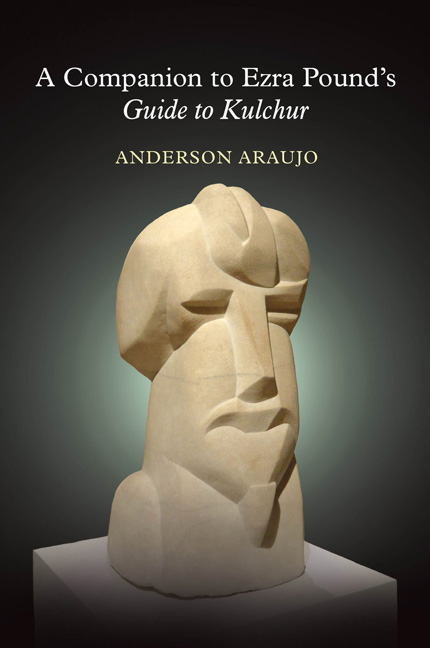Book contents
- Frontmatter
- Contents
- Acknowledgments
- Abbreviations
- Introduction
- Guide to Kulchur
- Part I
- Section I
- 1 Digest Of The Analects
- 2 The New Learning: Part One
- 3 Sparta 776 B.C.
- 4 Totalitarian
- 5 Zweck or the Aim
- Section II
- Part II
- Section III
- Section IV
- Part III
- Section V
- Section VI
- Part IV
- Section VII
- Section VIII
- Section IV
- Part V
- Section X
- Section XI
- Part VI
- Section XII
- Section XIII
- Addenda: 1952
- Notes
- Index
3 - Sparta 776 B.C.
from Section I
- Frontmatter
- Contents
- Acknowledgments
- Abbreviations
- Introduction
- Guide to Kulchur
- Part I
- Section I
- 1 Digest Of The Analects
- 2 The New Learning: Part One
- 3 Sparta 776 B.C.
- 4 Totalitarian
- 5 Zweck or the Aim
- Section II
- Part II
- Section III
- Section IV
- Part III
- Section V
- Section VI
- Part IV
- Section VII
- Section VIII
- Section IV
- Part V
- Section X
- Section XI
- Part VI
- Section XII
- Section XIII
- Addenda: 1952
- Notes
- Index
Summary
the iron coin of Lycurgus: Cf. note GK 32.
Lacedaemon: In ancient Greece, Lacedaemon was an area that comprised the city of Sparta and its surroundings. Lacedaemonian, strictly speaking, means Spartan.
I do not think HERODOTUS was the father of lies: Herodotus (c.484–c.420 BCE), Greek historian, author of the nine-volume History, chronicling the conflict between the Greek states and the Persian Empire between the sixth century and 478. Pound's reference to Herodotus's well-established reputation as a liar stems from the debatable nature of his claims to have traveled widely in the countries covered in History, especially Egypt, then a major player in the Persian Empire.2 Pound cites Herodotus, alongside Plato and Plutarch, as having “set a precedent” for GK (GK 207).
the verb hemerodanaidzein: From the Greek ἡμέρα δανείζειν (hēmera daneizein), which translates as “day-loaning” (with interest). In line with Pound's reasoning, δανείζω (daneizō) also translates as “put out money at usury, lend.”
Demosthenes: (384–322 BCE), Athenian political leader and Athenian orator from the Classical period. It is worth noting that Pound mistells the story of creditor fraud, as told in Demosthenes's speech Against Zenothemis (c.353–340 BCE). The “bloke” in question was Hegestratus, the skipper of a ship en route from Athens to Syracuse, Sicily, and back, who colluded with his friend Zenothemis to defraud a merchant named Protus and Demosthenes's cousin, Demon, for whom the speech was written. Hegestratus and Zenothemis's plan went awry, however. On the voyage to Athens they failed to sink the ship and thus also failed to render void their contractual obligation to repay loans they had incurred under the pretense of shipping grains on board, but which they had already used to ship goods back to their homeland. Hegestratus drowned and Zenothemis was brought to trial.
- Type
- Chapter
- Information
- A Companion to Ezra Pound's Guide to KulcherGuide to Kulcher, pp. 60 - 68Publisher: Liverpool University PressPrint publication year: 2018

